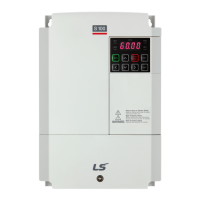An alarm occurs when the value set at PRT-86 is less than the
value set at PRT-87. To receive fan exchange output signals, set
the digital output terminal or relay (OUT-31 or OUT-33) to 38 (Fan
Exchange).
An alarm occurs when the value set at PRT-63 is less than the
value set at PRT-62 (the value set at PRT-61 must be 2 (Pre
Diag)). To receive CAP exchange signals, set the digital output
terminal or relay (OUT-31 or OUT-33) to 36 (CAP Exchange).
Displayed when the DB resistor usage rate exceeds the set value.
Set the detection level at Pr.66.
Tr tune error warning alarm is activated when Dr.9 is set to 4. The
warning alarm occurs when the motor’s rotor time constant (Tr) is
either too low or too high.
9.2 Troubleshooting Fault Trips
When a fault trip or warning occurs due to a protection function, refer to the following table
for possible causes and remedies.
The load is greater than the motor’s
rated capacity.
Ensure that the motor and inverter
have appropriate capacity ratings.
The set value for the overload trip level
(Pr.21) is too low.
Increase the set value for the overload
trip level.
There is a motor-load connection
problem.
Replace the motor and inverter with
models with lower capacity.
The set value for underload level (Pr.29,
Pr.30) is less than the system’s minimum
load.
Reduce the set value for the
underload level.
Acc/Dec time is too short, compared to
load inertia (GD2).
The inverter load is greater than the
rated capacity.
Replace the inverter with a model that
has increased capacity.
The inverter supplied an output while the
motor was idling.
Operate the inverter after the motor
has stopped or use the speed search
function (Cn.60).
The mechanical brake of the motor is
operating too fast.
Check the mechanical brake.
Deceleration time is too short for the load
inertia (GD2).
Increase the acceleration time.
A generative load occurs at the inverter
output.
The input voltage is too high.
Determine if the input voltage is above
the specified value.

